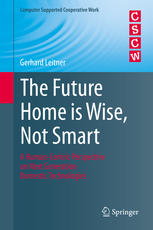

Most ebook files are in PDF format, so you can easily read them using various software such as Foxit Reader or directly on the Google Chrome browser.
Some ebook files are released by publishers in other formats such as .awz, .mobi, .epub, .fb2, etc. You may need to install specific software to read these formats on mobile/PC, such as Calibre.
Please read the tutorial at this link: https://ebookbell.com/faq
We offer FREE conversion to the popular formats you request; however, this may take some time. Therefore, right after payment, please email us, and we will try to provide the service as quickly as possible.
For some exceptional file formats or broken links (if any), please refrain from opening any disputes. Instead, email us first, and we will try to assist within a maximum of 6 hours.
EbookBell Team

4.8
94 reviewsThis book introduces the concept of the wise home. Whilst smart homes focus on automation technologies, forcing users to deal with complex and incomprehensible control and programming procedures, the wise home is different. By going beyond intelligence (or smartness) the wise home puts technology in the background and supports explicit (enhanced user-experience) as well as implicit (artificial intelligence) interaction adequate to the end-user’s needs.
The theoretical basis of the wise home is explored and examples for its application for future living are presented based on empirical studies and field work carried out by the author. Principles of HCI and the meaning of the home from differing scientific perspective are discussed and a research model (based on the concept of user experience (UX)) and iterations is introduced. This has resulted in field deployment guides being produced through a systematic development process.
The Future Home is Wise, not Smart will be essential reading to home system developers, designers and researchers, responsible for smart home deployment or Ambient Assisted Living (AAL) who will get insights on how to follow a novel approach in developing and adapting smart home systems to their users’ needs. Students with an interest in software design for pervasive systems will benefit by receiving information on how to develop and customise systems for the specific needs of living environments.